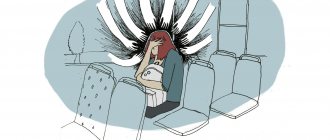Concluding this series of articles on character, based on the research of Nancy McWilliams, I propose to consider obsessive and compulsive personalities.
It is important to emphasize that thinking and doing are the leading motives of a person in modern times. And understanding the reasons for actions and emotional aspects are less valued.
General characteristics of obsessive and compulsive personalities
These people enjoy the thought process. It is predicted that they will be quite successful in those areas of activity that require scrupulous execution of tasks.
Psychologists note that this is a classic type of personality organization of a neurotic level. They have a ritualized nature of their actions. This calms them down and balances them out. For example, at intervals of three days, carry out general cleaning of the apartment. The clients themselves, who talked about this at psychological sessions, noted that it calms them down, gives them the opportunity to relax and switch from anxious thoughts.
Obsessive-compulsive personality disorder in DSM-5
People with this personality disorder are characterized by perfectionism, neatness, adherence to order, openness, dedication, control as opposed to flexibility. They worry excessively about small things, rules, plans and regulations. Their perfectionism makes it difficult to complete a task due to overly strict standards. They devote themselves to work and the pursuit of productivity to the point of foregoing recreation and friendships. When it comes to values, morals, ethics, such individuals show inflexibility, scrupulousness, and conscientiousness. They often find it difficult to throw away worn-out or unnecessary items that have no personal value. They will not hand over a piece of work to others until they are confident that it will be done on their terms. It is not surprising that such people are inflexible and stubborn. In addition, they are stingy in terms of money, and this thriftiness is explained by a “rainy day.”
The “DSM-5 Alternative Model for Personality Disorders” offers a different definition of this disorder (American Psychiatric Association, 2013). It is described as having difficulty establishing and maintaining close relationships due to perfectionism, limited emotional expression, and inflexibility. There are characteristic disturbances in identity, self-regulation, empathy and intimacy, as well as inhibition of affects, avoidance of intimacy, perseveration and rigid perfectionism.
The dominant need to control the internal and external world obliges these people to lead an overly structured and controlled life. They are prone to being stuck in doubt, willing to make commitments, and striving for perfection. They need to take into account all the circumstances in order to predict future developments and prepare for any eventuality.
To maintain the illusion of perfection, they must never make mistakes or admit defeat. Moreover, their tendency to delay decisions is due to their tendency to doubt. Essentially, they are deeply ambivalent, which allows them to maintain security at the expense of productivity, positive feelings and relationships. Such individuals consider anger and dependence to be consciously unacceptable and protect themselves from these feelings with the help of such psychological defenses as reactive formation and emotional isolation, as well as obsequious and accommodating behavior.
A psychoanalytic perspective on OCPD
Early psychoanalytic authors defined the obsessive-compulsive personality as regressing from the oedipal phase to the anal phase of development. Due to the punitive superego, defenses observed in obsessive-compulsive people include intellectualization, emotional withdrawal, withdrawal, and reactive formation. It was assumed that these people had difficulty expressing aggression that arose during the process of toilet training.
One way or another, modern researchers see the origins of this behavior model as much broader than anal fixation. As children, these people did not receive enough love from adults who cared for them. They felt no sense of self-worth and subsequently developed self-doubt. The obsessional pattern primarily serves to prevent any thought or feeling (whether hostility, sexuality, or others) that might cause shame, loss of status, hurt pride, feelings of defeat or weakness, or lack of respect. He views obsessive-compulsive patterns as a neurotic strategy. It protects against the exposure of any feelings or thoughts that potentially threaten physical or psychological well-being.
Close relationships cause a lot of anxiety in obsessive individuals. They are afraid of being overwhelmed by desires that they will have to endure while experiencing both frustration and fear of losing control. These people think that if they became perfect, they would receive the parental approval and support that they lacked in childhood. Psychoanalysts note that the cognitive style of obsessive-compulsive people is goal-oriented, attention to detail, lack of spontaneity and stuck thinking.
Drives, affects and temperament of obsessive and compulsive personalities
Psychologists note that such clients are hypersensitive. Sensitive to various aspects and nuances of the conversation.
Psychoanalysts pointed to the presence of anal problems in this personality type - fixation for approximately the period from 18 months to 3 years.
Cleanliness, stubbornness, restraint and concealment - the toilet training scenario. Parents taught such children to control their bowel movements. And such children acquire early bodily experience.
Rejection of what is natural, instead of what is naturally acceptable to him. The child is doomed to fail. It gives rise to aggressive fantasies and feels dirty.
In this regard, maintaining self-identity is important. A person has completely different, including physiological manifestations.
There is an increased sensitivity to ethical issues. Most likely, this is a consequence of introjects from childhood. For example, broadcasting to everyone around him that “men shouldn’t cry.”
The basic conflict is anger, fighting the fear of being punished. It's rationalized. Feelings are often hidden. They prefer to talk about what they think rather than what they feel.
Also, such individuals often experience anger. They are quite often irritated. But they deny it and get angry. This could be passive aggression. For example, endless irony.
Also, in a psychological session, such clients have shame. They place high demands on themselves. The same thing is projected onto others. Shame is recognized as mild sadness.
Signs of obsessive-compulsive personality disorder
In behavior, this disorder manifests itself in perfectionism. People with this disorder often suffer from workaholism. In addition to being dependable, they tend to be stubborn and possessive. They also tend to procrastinate and delay making decisions.
In relationships with people, they have a keen sense of social status and rank, and change behavior depending on this. Thus, they try to be respectful and obsequious with their superiors, but with subordinates and equals they behave arrogantly and authoritarianly.
Obsessive individuals may persistently insist that others act in accordance with their demands. They do not take into account and are not interested in how people perceive such demands. At their best, they are polite and loyal to the organizations and ideologies they support.
Their thinking style can be described as limited by boundaries and rules. They have difficulty setting priorities and seeing the future. They are people of “details” and often lose the larger vision of the project. In other words, they "can't see the forest among the trees." Their indecision and doubts prevent them from making a choice. Rigidity of thinking, combined with a lack of imagination and resistance to external influences, predetermine poverty and limited imagination. Like passive-aggressive people, obsessive-compulsive individuals exhibit a conflict between assertiveness and resistance and eagerness to please and obedience, but the reasons for this conflict differ.
Gloominess and inhospitability are their prevailing emotional background. They have difficulty expressing feelings of intimacy such as tenderness and warmth. They strive to avoid “soft” feelings, while they can express anger, frustration, and irritability quite freely. This moodiness and avoidance of feelings manifests itself in tense, stiff behavior in relationships.
In attachment relationships, the dominant theme is self-deprecation and positive evaluation of the other. These people are overly concerned with external judgments and evaluations and tend to rely on them to define themselves.
The behavior of a person with obsessive-compulsive personality disorder is characterized by a number of highly profiled actions, some of which are specific to this personality disorder, and others that overlap with similar or identical actions that are found in other personality disorders and also normally.
It follows that many of the behaviors found in obsessive-compulsive disorder do not require treatment unless they are prolonged, occupy the person's full attention, or cause problems for the person. For example, a person who returns to the car twice to make sure it is locked is unlikely to need treatment, even if he understands that by doing this against his will, he is greatly annoying himself and his loved ones.
In this chapter I will try to distinguish between behavior and thoughts. However, this is not always very easy to do. Often behavior is strongly determined by thoughts, just as many thoughts have an innate/actual behavioral meaning.
Compulsions
Obsessive-compulsive thinking exacerbates the performance of actions, just as fear exacerbates the need to engage in defensive behavior, which is actually self-destructive and paralyzing, much like compulsive behavior. People with obsessive-compulsive personality disorder, as well as those who suffer from obsessive-compulsive disorder, often, but not always, find themselves trying to do something over and over again.
Compulsions can be meaningful and productive or meaningless and unproductive. In any case, compulsions often begin with a pre-compulsive idea, the equivalent of anxiety due to the judgment that everything is not very good, and for everything to become good, the patient only needs to perform a simple, specific and complex action.
And by continuing to act compulsively, the patient discovers what is called a post-compulsive idea: that the behavior does not bring satisfaction and does not reduce anxiety.
Thus, the action can be repeated until it is performed correctly or brings at least minimal effect. The patient usually feels that an action has not been performed correctly or not performed enough times, and thus the same action (usually without variation) but sometimes with minimal changes is repeated at least once, but usually many more times, until the person will not be sufficiently satisfied with the result.
Typically, such completion requires adherence to invented arbitrary rules that are self-assertive and satisfying (eg, 60 is enough, I can stop, it will be good), which tend to prevent spread beyond the current situation.
The more repetitions required, the more severe the compulsive problems will be, and the more likely the patient will be diagnosed with obsessive-compulsive disorder rather than obsessive-compulsive personality disorder. Perhaps the most common example of a compulsive action that OCD sufferers engage in is repeatedly checking the bathroom light to see if it's off? Because if not, then a fire may occur that spreads to the entire house. It will be destroyed and lost.
Being overly organized (anal)
Some people with obsessive-compulsive personality disorder are wired in such a way that even the smallest things need to be arranged in an acceptable manner. For example, checks in a wallet should be in a certain order so as not to increase discomfort due to the likelihood of making a mistake while performing a ritual or not performing the ritual enough, which is in the first place for them.
Often overly organized people are perfectionists.
Over-disciplined, they usually create strict, mostly symbolic and contradictory rules to regulate themselves and those around them. Thus, the boss does not allow his subordinates to come to a meeting without an agenda and that agenda included a clause on whether to include the agenda as part of the agenda.
In scrupulousness, particularly with a religious component, the idea and practice spread further than other people in the same circumstances.
When religiosity becomes obsessive-compulsive, people become idiosyncratic practitioners of personal, cult-like religion.
These basically lie in the fact that they ignore the basic premise of religion - the relationship with God, and the peripheral aspects come to the fore: whether they perform rituals correctly or incorrectly, whether they perform as prescribed, instead of leaving things as forbidden.
The over-concern that causes religion to cross the line into religiosity involves typical obsessive-compulsive concerns about who to include and who to exclude, and for exactly what reasons.
Somatization
Some people with obsessive-compulsive personality disorder behave rebelliously, not through stubbornness in the form of irrational emotional fixation, which intensifies during arguments and requests (and has the opposite effect by identifying oppositional tendencies, rejecting rules somatically, anality: poor hygiene , habits such as spitting in public, coughing without covering the mouth, belching, nose picking, flatulence, and ignoring social conventions in clothing, hairdressing, reluctant showering, etc. People with obsessive-compulsive personality disorder often somatize to to oppose themselves to others who seem to demand that they do something with their body.
This category includes those who suffer from anorexia, as well as those who suffer from trichotillomania and other disorders, including some forms of Munchausen, which is characterized by complaints of imaginary illnesses, and those who cut themselves.
For people with obsessive-compulsive personality disorder, their somatization is often the best, if not the only, way they know to test the resolve of others and ultimately defeat those who wisely want to set reasonable boundaries for self-destructive, stubborn and somatic responses. Somatization makes it difficult to argue and gives hope that all concerned will respond with hopeless and self-defeating attempts to control bodily manifestations.
Preoccupation with being punished. Obsessive, anxious thoughts about physical punishment (beatings) push a person with obsessive-compulsive personality disorder to take precautions to be sure of safety and remain physically intact.
However, in some cases this activity is paradoxical, as people with obsessive-compulsive personality disorder engage in masochistic activities and are beaten in order to bring out what they fear most and end it on their own terms and in their own way. time.
Indecisiveness/fear of commitment.
Indecisive people with obsessive-compulsive personality disorder are unable to make decisions or stick to the ones they have made.
They can't start or complete tasks because they believe that whatever they do will be imperfect and not worth doing. The patient was chronically unable to decide after her husband's death whether to give up her two-bedroom apartment and move to a cheaper one-bedroom, or stay and pay more but have more space and enjoy the extra room.
The writer could not decide whether to continue working as a waiter during the day or leave this job to be a full-time writer. So he tried both options and it didn't work out. At first he waited tables, waiting for his talent to be discovered. Then he quit that job because although he made enough money, he wasn't doing art. Then he quit painting and found another job because while he was creating beautiful things, he couldn't pay the bills.
After both attempts, he felt that he had made a huge mistake. He spent a huge amount of time and energy regretting this mistake and correcting it, all the while reflecting on his little insignificant life and being puzzled by questions such as: “Why doesn’t art make money? Why is something that makes money not art?” He was angry at himself for not being able to compromise because he had problems, and at the same time angry at society for forcing him to make these compromises, even though it is very difficult. And the fact that society is so organized that artists are poor, and not artists are rich.
Defense and adaptation processes in obsessive and compulsive people
The leading defense for such individuals is isolation (for obsessive people) and destruction of what has been done (for compulsive people).
One can also note rationalization, moralization, and intellectualization in such clients. At a psychological session, this may look like some detachment, a long “explanation”, reasoning with an evidence base.
If we talk about cognitive defenses that are used against drives, affects and desires, it can be noted that for obsessive individuals, thought processes and cognitive abilities are of great value.
Feelings can be devalued, believing that their manifestation is associated with childhood, weakness, dirt. Moreover, it is very difficult for them to talk about some mistakes or failures that have occurred in their lives.
Nancy McWilliams in her book gives the example of a widow who cannot be consoled. She is busy and very immersed in all the details of the funeral of her deceased husband. This is a completely adequate situation for the event that took place, however, if you become too immersed in the hustle and bustle, then there is no access to feelings.
Obsessive company managers exhaust themselves and their employees. As a rule, they are very anxious and often hold meetings for the sake of meetings. Such people can be effective in fulfilling formal social roles. But at the same time, it is difficult for them to express tender feelings without experiencing anxiety and shame.
They often turn emotional interaction into depressing cognitive interaction. You can talk about something for a very long time, in different words, avoiding direct appeal to feelings.
In states of obsession approaching borderline states, detachment may appear as schizoid (detachment).
Behavioral Defenses Against Drives, Affects, and Desires
Destruction of what compulsive people have done is often noted.
Drunkenness, overeating, and sexual adventures are often observed in such individuals.
Compulsivity differs from impulsive action in its repetitive persistence.
Compulsive patterns are not always reasonable. There is over-involvement. They may exaggerate certain aspects of the situation.
Fantasies of omnipotent control. It is important for them to warn something. It is important to distinguish between thoughts and actions.
Obsessive and compulsive people believe that they can control the uncontrollable if only they do everything right. When working with them, the psychologist draws attention to the fact that there are things they cannot influence. They also delimit responsibility for committed actions and deeds. For example, such a client may complain to the psychologist that he is not able to fully influence his spouse. The extent of its influence is limited by psychological boundaries. Awareness allows you to build interpersonal relationships more correctly.
If we talk about reactive formation as a psychological defense mechanism of the psyche, it is important to note that obsessive and compulsive personalities are directed against the desire to be bad. There is a fixation on both sides of the conflict - cleanliness and disorder. They are frightened by internal impulses and strive to get rid of them.
Obsessive personality type and compulsive personality type: inner world and formation
Parents early teach a child of the obsessive and compulsive type to be responsible - to go to the potty, keep clothes clean, control emotions.
The mother feeds on a schedule, puts her to bed at the same time, establishes laws in the bathroom, prohibits masturbation and noise, and punishes for talking that is not relevant. The child develops high expectations for himself, perfectionism and strict moral standards.
Parents of an obsessive-compulsive child convey a key family message - “spend time well.” “You can’t waste time,” “there’s time for business,” “get busy, there’s no need to suffer through nonsense”—these and other parental phrases are recalled by people with an obsessive-compulsive personality type. As a result, a person does not learn to “knuckle down”, does not know how to rest without a plan, and in general to rest, because he feels guilty if he allows himself to spend time uselessly.
It was customary in the family to finish the food on the plate; I was forced to finish it against my will. “You can’t leave food when people in the world are starving,” my mother said. Until now, I eat food off my plate completely, I can’t throw away old bread, I make crackers out of it.
From a therapeutic conversation
Older children in the family may have an obsessive-compulsive character. Parents are busy with work and life, setting standards of behavior and expecting them to be observed at an early age for the child. The older child must study well, behave correctly with neighbors and relatives, and help. Parents reward correct behavior and punish incorrect behavior.
If the parents are loving, then the child grows up with an obsessive-compulsive personality type, expects a lot from himself, has a list of life goals, and an experience of childhood achievements.
If parents are unreasonably demanding and scrupulous, punishing not only for misconduct, but reproaching them for the desires and thoughts accompanying the misconduct, then the child’s character becomes more pronounced towards pathology.
What will people think if you are fat? No one will want to be your friend if you behave like this! You are already big and could clean the house better! — a client with compulsive psychopathology – bulimia nervosa – recalls her mother’s moralizing messages.
The opposite type of family structure is also associated with obsessive and compulsive personality types. This is the upbringing in a family of incompetent slob parents, in contrast to the control and moralism of caring parents.
Then the child decides not to be like his parents - to become organized, educated, competent, and to keep everything under control. Such standards were not practiced in the family, so they become rigid and are observed without a sense of proportion.
I decided that I would never, ever become like my parents. I achieved everything myself - transferred to another school, entered a university, worked at night. But sexual temptation is extremely difficult to resist, and I hate myself for it.
From a therapeutic conversation
The obsessive personality type is prone to thinking and does not feel the urge to implement their ideas. The compulsive personality type tends to act and rush into action before thinking about what is happening.
In situations of choice, the obsessive personality type is very worried about the loss of options as a result of choice. Endless doubts overcome the obsessive personality type, the decision is postponed until the “ideal” one comes. People of this type make lists of pros and cons, use decision-making techniques, and sort out possible options, wanting to avoid losing alternatives.
Procrastination sometimes continues until the deadline, when circumstances dictate the choice.
A compulsive personality in a situation of choice feels an urge to act. The common reason in both cases - procrastination or hasty choices - is the fear of error and the feeling of guilt if you make even the slightest mistake.
Thus, the fear of making the wrong decision leads to either endless deliberation or hasty, thoughtless actions.
Obsessive personality types and compulsive personality types fear their own negative feelings or personality traits and internally criticize themselves for them. Moreover, the subject of criticism depends on the messages of the families in which the compulsive or obsessive person grew up - sexuality, greed, laziness or envy.
The obsessive-compulsive personality is organized around the idea of control and moral purity. Correct behavior is equated to keeping the bad parts of oneself in check - aggression, anger, laziness, envy, lust, greed, cowardice.
One priest said that the devil does not hear a person’s thoughts, only God hears. I realized that I shouldn’t reproach myself for bad thoughts, because what matters is not what I think, but how I act. I used to scold myself even for unworthy thoughts!
From a therapeutic conversation
Some obsessive people take pride in the severity of their own demands on themselves.
Because obsessive-compulsive people value self-control, order, reliability, and loyalty and have difficulty releasing control, abilities in areas associated with spontaneity—sexuality, play, and humor—are reduced.
Object relations
The parents of such people tend to set high behavioral standards and demand obedience. They punish for wrongdoing.
In this regard, a pedantic pursuit of the ideal and systematic movement towards the goal are often noted.
Excessive strictness can demand a lot from children, including in the emotional sphere. A harsh upbringing is noted. In such families there is no place for love and affection; temptations are eradicated.
Psychologists note the morally elevated role of such clients when they talk about social status.
Control is the focus in such families. Punishment for freedom of expression.
Parents' restraint in emotions does not allow children to recognize their own feelings and sensations. And, even more so, talk about them. In a psychologist’s office with a client, you can learn to do this again.
Control is expressed through moralized statements. For example, parents might broadcast something like this to their child: “What will your neighbors think of you? How could you?". Or “That’s right!” Parents explain it this way.
Self-control and then rewards. This is welcomed in the family. Raised using shame.
Or vice versa, children may be abandoned. They are guided by the opportunity to survive according to the rules they received outside the home. The desire to cultivate opposite qualities in oneself.
Obsessive and compulsive self
Based on guilt. Concerned with issues of control and morality. Morality in terms of holding back negative manifestations.
Conditions similar to paralysis can occur when it is impossible to make a choice. At the same time, the psychologist helps the client feel his body, and only then get closer to the emotions that arise in connection with the situation that the person is talking about in the session.
As a rule, such clients delay making decisions until ideal conditions are achieved.
From such clients during a psychological session you can hear the phrase “Yes, but.” They seem to agree with the psychologist’s statement, but are looking for ways to avoid responsibility for this decision, or to find a “loophole” that will allow the issue to be resolved ambiguously.
Obsessive individuals tend to delay making decisions, especially important ones. Choice implies responsibility for one's actions. And compulsive people decide before they have thought about it.
They can be altruists. If a client talks about this at a psychological session, then it is important to find out what need is behind it.
The psychological support of compulsive individuals lies in doing, while that of obsessive individuals lies in thinking. They are afraid of their own hostile feelings. They value self-control above other personal qualities.
Focused excessively on details, instead of perceiving a holistic phenomenon or event. At a psychological session, it is important to clarify what is behind this. This leads to awareness.
Obsessive-compulsive personality disorder: symptoms
- Excessive concern with details, rules, lists, order, organization, or schedules to the point that the essence of the activity is lost.
- Insistence that others follow exactly their way of doing things, or an unreasonable reluctance to let others do a job out of a preconception that they will not do it correctly.
- Excessive predilection for work and desire for productivity, to the point of excluding activities related to leisure and friendships (which are not taken into account as having no obvious economic need).
- Indecision: Avoidance of decisions, procrastination, procrastination (but not due to an exaggerated need to receive advice or support from others).
- Excessive conscientiousness, strictness, and inflexibility in matters of morals, ethics, or values.
- Distorted expression of sympathy and affection.
- Insufficient expression of generosity and magnanimity (giving time, giving a gift or money) in the absence of personal gain.
- Inability to get rid of worn out or unwanted items, even if they are of no value.
There are typical situations, circumstances, or events that most often trigger or activate the characteristic maladaptive response of obsessive-compulsive personality disorder. These are usually unstructured situations with a lack of authority and/or demands for close and intimate relationships.
Therapeutic recommendations when a psychologist works with obsessive and compulsive clients
When working with such clients, a psychologist is required to maintain goodwill.
It is important to consider that they are vulnerable to shame. Eliminate advice.
And the struggle for power can lead to early object relations. They need warm, trusting relationships. This should be taken into account.
Creating emotional comfort is one of the leading tasks of a psychologist during a session. One may ask how much a psychologist can talk. Wait for rationalization to complete. When a client talks endlessly about something.
You can use art methods, metaphors, creativity. This will allow you to express your feelings and thoughts through additional means.
During the session, it is important to identify the affect and acknowledge it. What good will happen if I allow myself to feel these things? The answers to these questions add vitality. And sometimes it’s just important to be, not to do.
You should also not judge or control the client.
Differential diagnosis
Obsessive and compulsive individuals in comparison with schizoid individuals: obsessive individuals in the withdrawal stage are isolated. It is important for them to feel safe.
Compared with narcissistic personalities: Criticality and self-criticism of absessive and compulsive personalities. The psychologist may be suspected of moral failure.
Versus Organic Lesions: Rigidity of decision, it may appear as if the client has organic lesions.
It is important to note that the support of a psychologist will allow you to maintain emotional closeness with the client.











